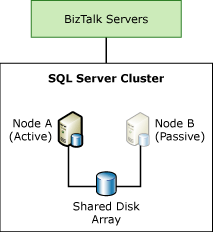Providing High Availability for BizTalk Server Databases
BizTalk Server relies heavily on SQL Server for data persistence. All other components and hosts in BizTalk Server have specific roles in the process of integrating disparate business applications (for example, receiving, processing, or routing messages), but the database computer captures this work and persists it to disk.
To provide high availability for the BizTalk Server databases, use Windows Server Failover Clustering to configure two database computers that are running SQL Server to create a server cluster. Server clustering provides redundancy and fault tolerance for the BizTalk Server databases. Unlike load-balanced clustering, where a group of computers functions together to increase availability and scalability, server clustering typically involves a pair of database computers in an active/passive configuration so that one computer provides backup resources for the other.
The following figure shows a BizTalk Server database tier with high availability through active/passive server clustering.

If the active database computer encounters errors or fails, the passive computer becomes active and assumes control over the database resources until the failed computer is repaired. The database service fails over and restores data connections to the new active computer and enables the BizTalk Server application to continue functioning.
For information about the databases that are installed by BizTalk Server, see Databases in BizTalk Server.
For information about backing up your BizTalk Server databases, see Backing Up and Restoring BizTalk Server Databases.
In This Section
Behavior of BizTalk Server Host Instances during SQL Server Failover
SQL Server database mirroring, Volume Shadow Copy service and AlwaysOn
See Also
Providing High Availability for BizTalk Hosts
Sample BizTalk Server High Availability Scenarios